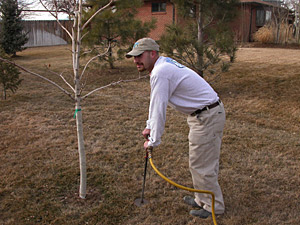While living in Castle Rock offers a country feel with the amenities of living close to a major city, there’s no doubt that parts of Castle Rock and Douglas County are windier and drier than our northern neighbors, such as Aurora or Centennial.
What this means is your trees can dry out. Give them a sip of water – or dry pines and declining spruce become pine beetles’ next tasty treat.
“It’s amazing to see the effects on a conifer that is dry and receives a proper winter watering,” Drew Maestas, a specialist in pine tree care, said. “One client reported nearly overnight new growth on some evergreens that even our certified arborist thought were goners.”
Winter watering is needed on pines and evergreens especially.
Hardwoods and conifers differ in the way they pull water.
Hardwoods, like ash and maple, pull water quickly and easily, as they have larger “pipes.” Conifers, in contrast, pull water more slowly, because their “pipes” are smaller.
To visualize it using a plumbing pipe, if you have a six-inch pipe to pull water for your shower, you’re going to have stronger pressure than when using a one-inch pipe to pull the same water.
“Without the watering, trees reach dangerous drought levels, making pesticide applications less effective.”
Dry air, low precipitation, little soil moisture, and changing temperatures are just part of fall and winter in much of Castle Rock.
There often can be little or no snow cover to provide soil moisture, particularly from October through March. Trees can therefore be damaged if they don’t receive supplemental water.
- You don’t live in Castle Rock to have to look at pine trees like this!
The result of long, dry periods during fall and winter is injury or death to parts of plant root systems. Affected
plants may appear perfectly normal and resume growth in the spring using stored food energy. Plants may be weakened and all or parts may die in late spring or summer when temperatures rise.
Weakened plants also may be subject to insect and disease problems.

